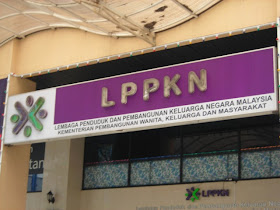Its said that the late Mr. Singh used to own all that land behind this building up to Jalan Putra. Looks like Jalan Raja Laut was the boundary between his lands and that of the late Haji Mohd Taib.
 Behind the Dharamsala is the Wisma Havela Thakardas.
Behind the Dharamsala is the Wisma Havela Thakardas.According to a grandson of the late Mr. Havela Singh, his grandfather's will stipulates that at least 10% of the proceeds from his estate should be donated to charity. This amounts to a few million ringgit monthly. In keeping with the terms of the will, the family sponsors a free clinic in the Tiong Nam area among other things.
 Wisma Sime Darby at the junction of Jalan Raja Laut and Jalan Sultan Ismail.
Wisma Sime Darby at the junction of Jalan Raja Laut and Jalan Sultan Ismail.Did you know that Sime Darby takes it's name from its two founders, William Middleton Sime, a Scottish adventurer and fortune seeker, and Henry Darby, an English banker.In the 1960's there used to be a mechanic shop there. Previous to that this used to be an ice factory and that's probably why the area is still known as "ais aaleay" in Tamil.(Source: Wikipedia)
 The Sultan Ismail LRT Station.
The Sultan Ismail LRT Station.The red roofed building in the front is part of the Batu Road School premises (about it in my next post - Schools along Raja Laut). The LRT station has resulted in the school's playing field being shrunk almost 50%.
 The UniAsia Insurance building along Jalan Sultan Ismail.
The UniAsia Insurance building along Jalan Sultan Ismail.The American Peace Corps had an office at this site in the 1960's, operating from one of those yellow wooden government buildings that were here. In case you're wondering, Malaya was still considered an under-developed country then.
 The Population and Family Development Board. This was formerly the Family Planning Board.
The Population and Family Development Board. This was formerly the Family Planning Board. We need a big building to house all those people who plan the development of our nation's population and our families.
We need a big building to house all those people who plan the development of our nation's population and our families. The Tun Ismail Md Ali Tower - it's been here awhile, but I don't know what offices it houses.
The Tun Ismail Md Ali Tower - it's been here awhile, but I don't know what offices it houses. The building is named after the second Governor of Bank Negara Malaysia (Central Bank of Malaysia) who died in 1998.
The building is named after the second Governor of Bank Negara Malaysia (Central Bank of Malaysia) who died in 1998.  Medan MARA along Raja Laut.
Medan MARA along Raja Laut. It's an office complex but also has shops and food outlets.
It's an office complex but also has shops and food outlets.MARA or Majlis Amanah Rakyat (People's Trust Council) was originally the Rural Industrial Development Agency (RIDA) set up the British Colonial Admisistration in 1951.
Its main objective is to aid, train and guide Bumiputras (Malays and other indigeneous peoples) in the areas of business and industry.
 A view of Pertama Complex from Raja Laut.
A view of Pertama Complex from Raja Laut.The complex is owned by UDA Holdings Berhad. UDA or the Urban Development Authority was originally a government agency. It was later incorporated as UDA Holdings Sdn. Bhd. a private limited company. UDA has since gone public and is listed on the Main Board of the Kuala Lumpur Stock Exchange (KLSE).
 Pertama Complex's food court. "The Ship" once famous for its steaks has an outlet here.
Pertama Complex's food court. "The Ship" once famous for its steaks has an outlet here. Sogo from Raja Laut.
Sogo from Raja Laut.The building is owned by Pernas or Perbadanan Nasional (National Trading Company) an agency set up during the Second Malaysia Plan.
 A corporate building nearing completion next to Sogo.
A corporate building nearing completion next to Sogo. G S Gill's seen from Raja Laut.
G S Gill's seen from Raja Laut. The bridge across the Gombak River and Jalan Kuching connecting the Bandaraya LRT Station to the Bank Negara KTM Station.
The bridge across the Gombak River and Jalan Kuching connecting the Bandaraya LRT Station to the Bank Negara KTM Station. The Employees Provident Fund building.
The Employees Provident Fund building. The EPF or KWSP (Kumpulan Wang Simpanan Pekerja) is the government agency charged with managing the retirement fund of all private sector employees in Malaysia.
The EPF or KWSP (Kumpulan Wang Simpanan Pekerja) is the government agency charged with managing the retirement fund of all private sector employees in Malaysia. The Tun Razak tower.
The Tun Razak tower.Tun Abdul Razak bin Haji Dato' Hussein Al-Haj, also called the Father of Malaysia's Development, was the 2nd Prime Minister of Malaysia.
 Bank Islam, Malaysia's first Islamic Bank's first branch office is in this building.
Bank Islam, Malaysia's first Islamic Bank's first branch office is in this building. The Dewan Bandaraya 2 (City Hall 2). This was formerly the PKNS (Perbadanan Kemajuan Negeri Selangor of Selangor State Development Corporation) builing.
The Dewan Bandaraya 2 (City Hall 2). This was formerly the PKNS (Perbadanan Kemajuan Negeri Selangor of Selangor State Development Corporation) builing. Dewan Bandaraya Kuala Lumpur building.
Dewan Bandaraya Kuala Lumpur building. DBKL.
DBKL. City Day (February 1) celebration signage is already in place.
City Day (February 1) celebration signage is already in place. The courtyard infront of the DBKL building, facing Jalan Parlimen.
The courtyard infront of the DBKL building, facing Jalan Parlimen.
...very well displayed and explained! So which street next?
ReplyDeletecan i know berapa tingkat bangunan dbkl ? this is for my research :)
ReplyDelete